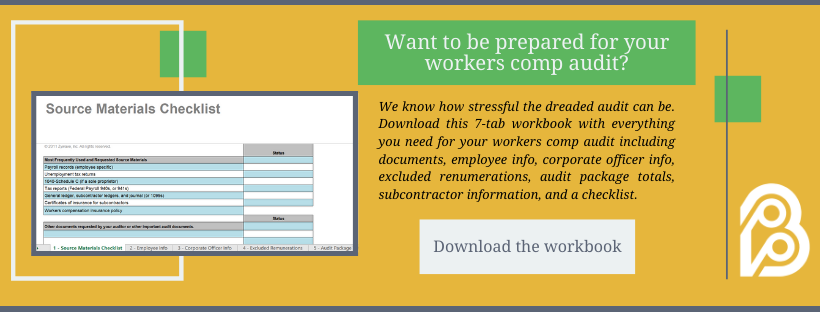3 Common Problems with Workers' Compensation Claims
If you’re a MA business owner, you probably groan at the mere utterance of the words “workers’ compensation.” We get it - it’s required in your state but it is complex to apply for, there are often mistakes in how you are rated, you need to participate in an annual audit, and it’s expensive. Sometimes it may make you reconsider your life decisions to become a business owner in the first place.
Well if you think the frustration ends there, you’d be wrong. If you are ever in the unfortunate scenario of filing a workers’ comp claim, you will quickly learn that it isn’t always a seamless experience.
As workers’ comp providers with over 100 years of insurance experience, we here at Berry Insurance have seen a number of our commercial clients deal with less-than-pleasant claims, so we are more than familiar with what can go wrong.
That’s why we have prepared this article - for you to learn all about the common issues with workers’ compensation claims so you can hopefully take steps to avoid them. So below, we will get into the three most common issues we see during the workers’ comp claims process.
Table of contents:
1. Claims can be misfiled:
Between the employers, employees, medical providers, and insurance representatives, there are a lot of different people involved in a workers’ compensation claim.
So if all these moving pieces don’t maintain adequate communication, it is entirely possible claims will be misfiled, which can lead to frustration and lost time.
Here’s a scenario we’ve heard on multiple occasions: an employee gets injured at work then sees a doctor for the injuries. The employee forgets to mention to the doctor that it was work related so the doctor’s office files it under the employee’s health insurance. As you can imagine, this employee then becomes upset when they receive a medical bill in the mail.
In this case, the employee should have told the doctor’s office it would be filed through workers’ compensation. That way, the correct paperwork could have been filed right away so the employee would never receive a bill and the claim wouldn’t have been as delayed.
2. Claims can take a long time:
At almost every step of the claims process, there are opportunities for delay.
Take the example we went over in the last section, for instance. When the employee failed to mention to his doctor that their injury was work-related, they slowed down the claims process.
But that is just one of the many instances that can make a workers’ comp claims process cripplingly slow.
We’ve often seen employees become injured on the job but delay reporting it because they don’t think they need medical attention right away.
We’ve also seen delays in medical exams. In addition to normal wait times to get into a doctor (we’ve all been there), we’ve also heard of injured employees continually canceling or postponing doctors or physical therapy appointments, dragging out the claims process while the employee is being paid that entire time.
Plus, we all know how medical billing can work. Oftentimes, it takes medical billing offices a long time to process bills, and that process only gets more drawn out when you involve a workers’ comp carrier.
Another scenario is re-injury. If an injured employee is cleared to go back to work then re-aggravates their injury, the workers’ comp claim will be extended even longer.
Basically, there is a lot that can bog the claims process down. And there are specific rules claims adjusters have to follow, especially if a lawyer is involved, so unfortunately claims often move more slowly than employers would like.
3. Claims can cost more than you expect:
I’m sure you know workers’ compensation claims are expensive, but I wouldn’t be surprised if you weren’t aware of exactly how expensive they can be.
In fact, for every dollar an insurance company pays on a claim, the employer will pay back approximately three times that amount over the next three years.
That’s because workers’ compensation doesn’t actually “pay for” claims, it just finances them. As an employer, you are expected to pay back that claim … and more.
Why? Because once you experience a workers’ comp claim, your premium could skyrocket.
In addition to paying for injuries, lost wages, and increasing premium, there are also some indirect costs that can escalate your premium even more. Things such as overtime, lost productivity, employee morale, logistics and more can exacerbate your workers’ comp claim cost even more.
Another thing employers don’t always realize is that when a workers’ comp carrier is paying out lost income, they look at the last 18 months of pay. So if someone is working part time or volunteering for you, the workers’ comp carrier will also consider any full time or other jobs they are paid for, which you will be on the hook to pay out.
Take a proactive approach to your workers’ comp claims
We’ve talked a lot about what can go wrong during the workers’ comp claims process, but what about what can go right?
It’s not always doom and gloom. If you are prepared on how to file a workers’ compensation claim, you can avoid some of these issues and have a smoother claims process.
Through proper education and preparation, we have helped many of our commercial clients navigate workers’ comp claims more easily.
To learn more about how you can make the process easier for you, read this article: What to Do When an Employee is Injured (and How to File a Workers Compensation Claim).


.jpg)
